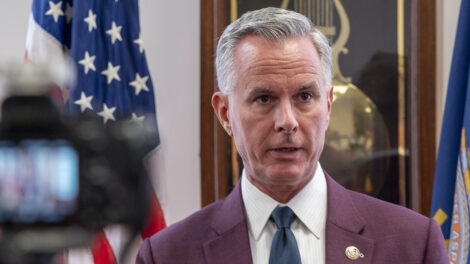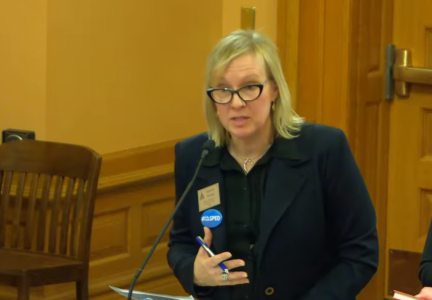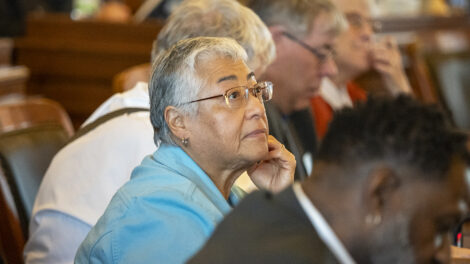Douglas County lawmaker proposes $410M tax cut for upcoming special session; he wants more focus on property tax cuts

photo by: Chad Lawhorn/Journal-World
Sen. Tom Holland, D-Baldwin City, speaks at a press conference on June 12, 2024 at the Kansas Statehouse.
In his 22 years in the Kansas Statehouse, Douglas County lawmaker Tom Holland is certain of one thing: Property taxes are the most hated of taxes by constituents.
The Democratic state senator from rural Baldwin City, however, is much less confident that legislators will do anything to address rising property taxes at an upcoming special session of the Kansas Legislature.
When that session begins on Tuesday, tax bills that focus on lowering state income tax rates are expected to be prevalent. Holland, though, is hoping to gather a coalition of lawmakers to support significant reductions in property taxes rather than cuts to income taxes, he said at a press conference Wednesday to promote a tax bill that he has introduced for consideration at the upcoming special session.
Holland, who is the ranking Democrat on the Senate Assessment and Taxation Committee, said there is an easy enough argument to make against income tax cuts — especially if you have been in the Legislature long enough.
“I was here during the Brownback tax experiment,” Holland said of former Gov. Sam Brownback, who led in the 2010s when income taxes were cut significantly, but the state also faced a major budget crunch that led to a downgrade of Kansas’ bond rating. “I saw the fiscal fall off, $700 million, once that plan fully engaged.
“I’m not going to walk out of here voting for something that I’m concerned will set the state up for fiscal failure down the road.”
Holland — who was the 2010 Democratic nominee for governor — is not seeking reelection, and next week’s special session is expected to be among his last acts as a legislator.
His plan — which he is calling a “Kumbaya Tax Plan,” because all elements individually have received bipartisan support in the past — has a heavy focus on property taxes. The biggest component has to do with the statewide property tax rate of 20 mills that every property owner pays for K-12 school funding.
Under Holland’s plan, that statewide mill levy would drop to 18 mills. Additionally, Holland is proposing that each residential home in the state receive a $125,000 exemption from taxation. Currently, the exemption level is about $42,000. In other words, a $350,000 home with the current exemption is taxed as a $308,000 home. Under Holland’s proposal, it would be taxed as a $225,000 home.
That could result in significant savings for homeowners. Using the $350,000 home above, the property owner would pay $236 less in property taxes per year, Holland said. Collectively, Holland expects the property tax changes to save residential homeowners about $190 million per year statewide.
Holland’s plan also includes some non-property tax provisions. His plan calls for the elimination of all income taxes on Social Security benefits, producing about $152 million in tax savings in fiscal year 2025. Other items in the plan include accelerating the elimination of the sales tax on food, moving the expiration of the food sales tax from Jan. 1 to Oct. 1. That would save $38 million in taxes in fiscal year 2025. In total, Holland’s tax plan would produce an estimated $410 million in tax cuts in fiscal year 2025 and about $340 million in fiscal year 2026. By comparison, Democratic Gov. Laura Kelly in May vetoed a bipartisan tax bill that would have cut taxes by more than $640 million in its first year and by about $460 million in future years. Kelly said the proposed tax cuts were too large and threatened the stability of the state’s budget in future years.
Holland is not a member of the Democratic leadership team, and he said he’s not sure what type of consideration his plan will receive. However, he said he’s hopeful the unique nature of a special session — which can allow for bills to come to the floor for a vote without going through the legislative committee process — will give his bill a chance for a vote in the Senate and House.
“In my mind,” Holland said, “we really need to get back to the will of the body — the will of the Senate, the will of the House — rather than the will of leadership … Let’s let people vote on policy they really want to vote on.”





